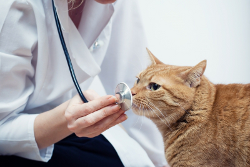FIV is a lentivirus that is closely related to human immunodeficiency virus (HIV). FIV does not affect humans and HIV can not affect cats but the genome structures are similar and both viruses attack the immune system in a similar fashion.
FIV affects two to four percent of cats worldwide. There are five subtypes of the virus (A-E) and it is the only non-primate lentivirus that causes a syndrome similar to AIDS. Fortunately, FIV is not always fatal for cats. An infected cat can go on to live many years while carrying the virus, if proper care of the cat is maintained.
How FIV is Transmitted
FIV is most commonly transmitted by deep bites or scratches from an infected cat. The virus enters into the bloodstream by way of the infected cat’s blood-tainted saliva. This type of transmission usually occurs during an aggressive dispute or territorial fight. Thus, intact adult males are the ones who most frequently contract the virus. Less commonly, it can be transmitted to kittens by their mother. FIV has not been found to be contracted by casual contact, such as:
- Sharing food dishes and litter boxes
- Sneezing
- Social grooming
An FIV+ cat can live indoors with a cat that does not carry the virus and as long as blood is not shared, he will not infect the other cat. There is always the threat of the FIV+ cat being at risk for secondary infection brought into the environment by another cat. Extreme diligence is imperative when caring for an FIV+ cat.
Signs and Symptoms of FIV
FIV attacks the cat’s immune system much in the way HIV attacks a human’s immune system. It also progresses through similar stages, beginning with the initial or acute phase. During this stage, symptoms are mild and may consist of:
- Loss of appetite
- Lethargy
- Fever
- Swollen or enlarged lymph nodes
The acute phase is short and symptoms will disappear. Following this stage will be an asymptomatic stage. The cat will have no noticeable symptoms for a variable length of time. The asymptomatic stage can last anywhere from a few months to many years while the virus is dormant and undetected by the immune system. Some factors play a role in how long the asymptomatic stage lasts. Factors include:
- Pathogenicity of the virus
- Particular FIV subtype (A-E)
- Cat’s age
- Exposure to other pathogens
During the final stage, the cat will progress into what is called the feline acquired immunodeficiency syndrome (FAIDS). It is in this stage where the cat is immensely susceptible to secondary diseases. A secondary infection is what will ultimately claim the cat’s life due to the immune system’s inability to fight it off.
Diagnosing FIV
A blood test is how FIV is routinely diagnosed. The test will look for the presence of antibodies in the blood, not for the virus itself.
False positives do occur when antibodies are present but the virus is not. This most commonly happens in kittens that are tested for FIV after ingesting milk from their FIV+ mother, and when a cat has previously been vaccinated against FIV. Because of this, kittens under eight weeks of age and cats that have been vaccinated are not tested.
Kittens may go on to test negative for the FIV antibody in the future, after the antibodies from their mother’s milk leave their system.
Cats that have been immunized against FIV will test positive for the rest of their lives, even though they are not infected. Therefore, testing can be inconclusive and immunization against FIV remains optional and will be discussed by the attending veterinarian on a case-by-case basis.
Treatment for an FIV+ Cat
 Unfortunately, antiviral treatment for FIV does not yet exist. Because cats can carry the virus for such an extended amount of time before symptoms present, treatment mainly focuses on extending the asymptomatic stage.
Unfortunately, antiviral treatment for FIV does not yet exist. Because cats can carry the virus for such an extended amount of time before symptoms present, treatment mainly focuses on extending the asymptomatic stage.
If symptoms have already presented, treatment focuses on the secondary effects. The following treatments have proven to be very beneficial in easing the effects of FIV:
- A healthy diet, no raw foods
- Parasite prevention and control
- Antibiotics for secondary infection
- Fluid replacement therapy
- Immune-enhancing medication
- Anti-inflammatory medication to control pain
An FIV+ positive cat can still maintain a comfortable quality of life for many years to come. Keeping your FIV+ positive cat indoors and away from any sources of possible infection is extremely important. With a compromised immune system, an FIV+ cat will not have the proper defenses to ward off secondary infection. Any minor illness or disease could be life-threatening for him.
Preventative Measures
The best way to prevent your cat from contracting FIV is to keep him indoors. Free-roaming cats tend to get into territorial disputes with other cats from the neighborhood and/or feral cats. Wounds from an aggressive encounter will lead to the contraction of FIV if one of the cats is already a carrier of the virus.
Another way to help prevent these territorial spats is to neuter your male cat. Intact males are more likely to respond aggressively to other cats intruding on his territory.
If your cat will be spending any time with other cats, know their FIV status.
If you are bringing a new cat into your home, make sure they have been tested for FIV.
Effective vaccination against the virus does exist but because of possible testing complications as stated above, you will need to talk to your veterinarian to decide if immunization is the best route to take based on your cat’s individual living circumstance.
Thanks for visiting www.catdandruffclinic.com, if you liked this article please like us using the side bar .
Related Posts:



Comments are closed.